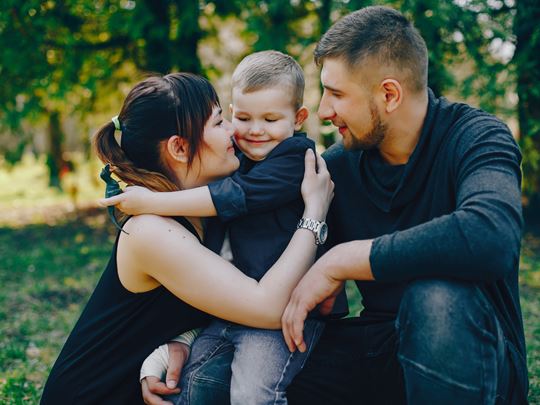
Whether you foster as a single person or as a couple, fostering is a family affair, and every foster parent needs a strong support network to help manage their responsibilities and give young people the childhood they deserve.
At Orange Grove, we encourage foster families to nominate people to become back-up carers as part of the assessment process to form a vital part of their support network.
But what is the role of back-up foster parents? Why are they essential in a caregiver support network, and how can they make fostering more fulfilling for both you and the child in your care? Read on to find out.
What is a fostering support network?
Fostering support networks are the people you, as a foster parent, can lean on to help you manage the practical and emotional challenges of fostering. They may be a friend you can talk to in confidence or a family member who can pick up the children from school if you have an emergency, or individuals from within the fostering agency or local authority you work with.
When you foster with us here at Orange Grove, your support network also extends to include a range of fostering professionals, such as social workers, family support workers and education experts. You also have opportunities to build connections with other foster parents who truly understand the ups and downs of fostering through our regular support groups and meet-ups.
These fostering support networks give you confidence in your role because you know you’ll always have someone to turn to, no matter the scenario. But what happens if you need more regular hands-on support or somebody to look after the child in your care in an emergency? That’s where back-up foster parents come in.
What are back-up foster parents?
When you raise your own children, you may turn to your family and friends to help with certain aspects of childcare. For example, if you work 9 - 5, you may ask a friend or family member to collect your children from school and look after them until you get home. You may also ask grandparents to look after your children overnight if you're invited to a wedding or want to spend quality time with your partner. When you foster, back-up foster parents allow you to do the same.
Back-up foster parents are individuals within your friends and family support network who can take on more regular caring responsibilities and even look after the child in your care overnight from time to time if needed. They provide the support many traditional families rely on, helping you balance fostering with work commitments, self-care and activities you enjoy.
The table below illustrates the type of care friends and family members, back-up carers, and respite carers can provide.
| Family & Friends | Family & Friends with a DBS check | Back-up Carers | Respite Carers | |
|---|---|---|---|---|
| Spend time with your child at home with you around | √ | √ | √ | |
| Drop a child off at school or an appointment in an emergency | √ | √ | ||
Regularly support you with school drops-offs / pick-ups | √ | |||
Care for your child for a few hours in an emergency | √ | √ | ||
Care for a child overnight as a one-off | √ | √ | ||
| Care for your child overnight regularly | √ | |||
| Care for your child for two nights + | √ | √ | ||
| Care for your child in their own home | √ | √ | ||
| Care for your child in your home | √ | √ |

Benefits of having back-up foster parents
You may wonder if back-up foster parents are necessary and whether you really need family members to provide official support. However, back-up carers can positively impact foster families in several ways, here are the benefits of having this type of support at hand.
They can offer regular practical support
Casual and one-off support may be possible in an emergency, but there is only so much help family members can provide, without needing to become official back-up carers. For example, if you get stuck at work one day and need someone to pick up the children from school, a trusted family member or close friend may be able to offer this one-off support. However, if this becomes a regular occurrence, and a friend or family member will be spending more one-on-one time with the children you foster, they’ll need to become a back-up foster parent.
This type of support is particularly crucial if you’re a single foster parent. It means that if you need to run an errand, attend an appointment, or have your child picked up from an after-school club while you finish work, you have someone to rely on to care for the child you foster while you do so.
If you’re long-term fostering or fostering children with disabilities, the reality is that at some point, you’ll need a helping hand. Although respite care is available, it generally needs to be arranged further in advance. Your back-up foster parents, however, will be just a phone call away and could be available at a moment’s notice. Plus, your children will see them so often that they are almost like their extended family too!
They support a sense of belonging
Many children spend time with their extended family, whether having a sleepover at their grandparents' house or going on a day trip with their auntie or uncle. Having a back-up foster parent gives the children you foster the opportunity to enjoy similar experiences, which could help them develop a sense of belonging, feel less different from their peers, and enrich their childhood.
Involving your wider family in the life of the child you foster could also help them feel like part of the family, especially if a regular arrangement is made. For example, you may arrange for the child in your care to have a movie night with your nephews and nieces at your siblings' house every week.
These moments, which many of us grew up with and may take for granted, could help the child in your care learn to trust others and provide a foundation for them to grow in confidence and self-esteem.
They help you find balance
Being passionate about changing the lives of young people is an essential quality of foster parents. However, this dedication may impact your own well-being if you don't find a balance between your caring responsibilities and self-care. It's important to remember that self-care isn't selfish - it's necessary, and although you may be able to put your own needs aside in the short term, over time, it could lead to burnout.
Burnout can be difficult to recover from and could take the enjoyment out of fostering, so having back-up foster parents can help you find this balance. For instance, if you enjoy a particular hobby or go to the gym, you can establish a regular arrangement with your back-up foster parents so you can continue to do the things you love.
When you're well-rested and have time for the things that matter to you, you'll feel happier and more in harmony with yourself. This means you'll have more energy, patience and enthusiasm for your fostering role, creating a more nurturing and stable environment for the children in your care.
They make foster families stronger
Back-up foster parents make foster families stronger. Their practical and emotional support can ease the pressures of everyday life and give you more confidence in your role. These essential members of your support network will also develop a deeper understanding of your challenges, knowing when to step in to help without you even needing to ask.
If you’re new to fostering, you may believe that you can manage fostering responsibilities all by yourself. However, the saying is true, it really does take a village to raise a child, and as time goes on, you'll find that having back-up carers to rely on makes your journey even more rewarding.
A well-supported family creates a stable, nurturing, and safe environment for the children in your care, leading to better outcomes and reducing the likelihood that a child will leave your care unexpectedly. It also means you'll have a close circle of individuals to share the joys of fostering with, like reaching milestones or seeing the child in your care learn to trust again, further enhancing your fostering journey.
How do friends and family members become back-up foster parents?
When you foster with Orange Grove, you join an agency that truly understands the importance of foster care support networks. Not only do we build a community of support around you, but we also help you identify the people in your life who would make great back-up carers.
These back-up carers will then undergo a mini assessment and background checks to ensure they can provide the child in your care with a safe and stable environment in your absence.
The mini-assessment and background check typically take three to four weeks to complete and involve the following steps:
- Your chosen friend or family member will meet with your supervising social worker.
- Your supervising social worker will request references from their workplaces, family members, and friends who’ve known them for a while.
- Your potential back-up carer will undergo a DBS check and health and safety assessment of their home.
- We then ask possible back-up carers to attend our Prepare to Foster Training, where they’ll review the workbook provided and consider the questions asked. Your supervising social worker will discuss their answers, including them in their report.
- Your supervising social worker's report will then be sent to the agency’s Regional Manager for approval.
- Once approved, your back-up carer will receive supervision from a social worker twice a year.
- Details of back-up foster parent arrangements will be written in the child’s placement plan and regularly reviewed to ensure they remain in the child’s best interests.
Once this streamlined process is complete, both you and the children in your care will be able to reap the benefits of having back-up foster parents in your support network.
If you’re new to fostering and would like more information on back-up carers or our support for single foster parents, please get in touch. If you already foster with us and think you’d benefit from family members or friends becoming back-up carers, talk to your supervising social worker; they’ll be happy to provide further insight into the process.





